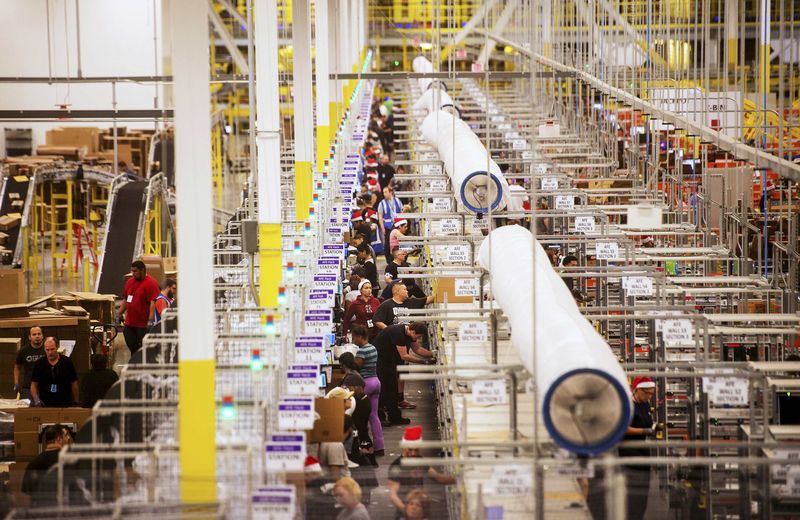By Deepa Seetharaman and Nick Carey
SAN FRANCISCO/CHICAGO (Reuters) - Amazon.com Inc (O:AMZN) packages ordered by its Prime members regularly arrived late over the holidays, a Reuters/Ipsos survey shows, reflecting the strain on the logistics network that transformed the company into an e-commerce powerhouse.
Customer satisfaction with Prime is extremely high - 96 percent are happy with its two-day shipping service, the survey revealed. But the results raise questions for Amazon as it expands and takes greater control of its shipping system.
The $99-a-year service was launched a decade ago with the guarantee of standard, reliable two-day shipping on online orders. Prime has since become the cornerstone of Amazon's growth - and a testing ground for new services ranging from TV and video to delivery-by-drone.
Amazon said U.S. Prime memberships increased 50 percent last year. Analysts reckon that the largest U.S. online retailer now promises standard two-day shipping to what amounts to nearly one-third of U.S. households.
In the Reuters/Ipsos poll conducted last month, 10 percent of about 1,700 Amazon shoppers who chose the two-day shipping option said packages ordered between November 1 and December 31 did not arrive on the expected day.
Greg Greeley, head of Prime, said the Reuters figures on delay sounded "very suspect" and that Amazon monitors the issue very closely.
"Our internal data shows significantly better results," an Amazon spokeswoman added, without providing specific figures. "But any miss is an error and we continue to work very hard to ensure fast, reliable and accurate delivery for customers."
The survey figures reflect the complexity and high cost of shipping orders from distribution centers to customer's homes -the so-called "last mile."
"As Amazon keeps raising the bar, it keeps raising the business risk for itself because the last mile is a messy place," said Bhaskar Chakravorti, senior associate dean for international business and finance at Tufts University's The Fletcher School.
Satisfaction rates could erode if the late shipping problems continue, said Hayley Silver, a vice president at e-commerce researcher Bizrate Insights. "Some customers will remain Prime members because they love the other aspects Prime offers them. Some may not because on-time delivery was the most important thing to them," she said. Others will simply order earlier, Silver added.
SPEED MERCHANTS
Amazon has increasingly tapped local and regional package delivery companies to cut costs and improve speeds. None of the firms Amazon lists as delivery partners on its website would comment for this article.
This is the first time Reuters has conducted this survey so it's unclear how Amazon fared in the past. In addition, Reuters didn't compare delays at Amazon with other retailers. The Reuters/Ipsos survey had a credibility interval of plus or minus 1.4 percentage points.
Amazon's net shipping costs as a percentage of revenue have remained relatively constant over the last several years, at about 4.7 percent.
However, Amazon and other shippers continue to worry about rising costs. Early this month, United Parcel Service Inc (N:UPS) said it would begin applying surcharges to deliver packages to homes. UPS, which reported that its earnings were hit by holiday shipping expenses, said its own cost to deliver a package to a residence are three times more than to a business.
Guaranteed two-day shipping on items as low as a few dollars - such as $5.17 (3 pounds) for a set of measuring spoons - costs Amazon big. Prime is also the vehicle for Amazon's other pricey ventures, including film and television production, same-day shipping and even one-hour delivery in New York.
The challenge posed by Prime's growing popularity and scope has not gone unnoticed at Amazon, which is trying to speed deliveries and take more control of the process.
One of Amazon's chief concerns is it doesn't have control of the entire delivery from warehouse to consumer, said former employees who spoke on condition of anonymity.
For years, the company has been testing ways to take more control of the last mile, those ex-employees said. Those steps include building its own local delivery fleet and using the trucks designated for its Amazon Fresh grocery service to deliver orders.
This mirrors what Amazon has already done in the United Kingdom. The online retailer previously outsourced delivery to local firms, but customers complained in large numbers during the 2012 holiday peak season when packages went astray.
So Amazon began creating its own "fast, last-mile delivery networks in the U.K. where commercial carriers couldn't support our peak volumes," CEO Jeff Bezos said in his annual shareholders letter last year. "And there is more invention to come."
